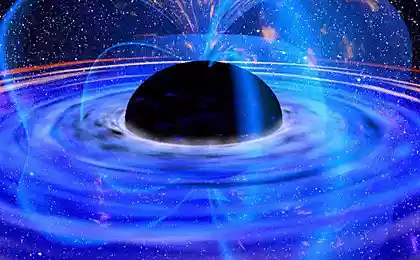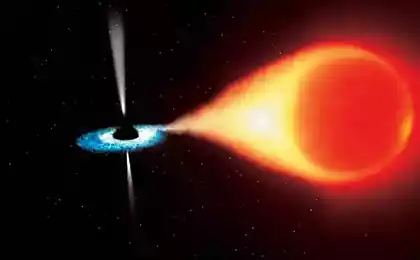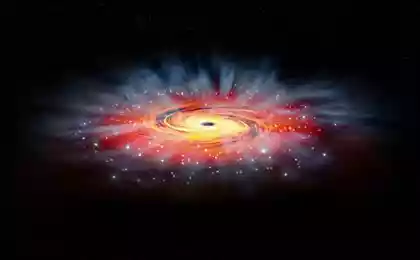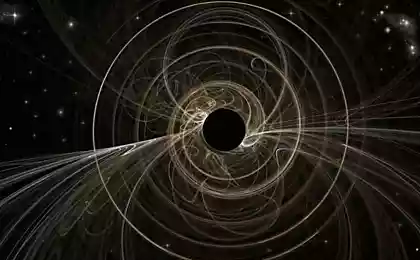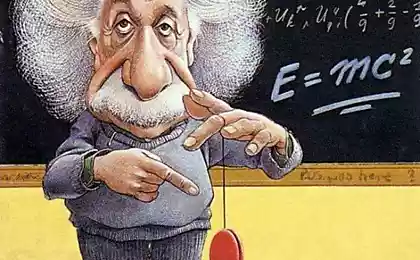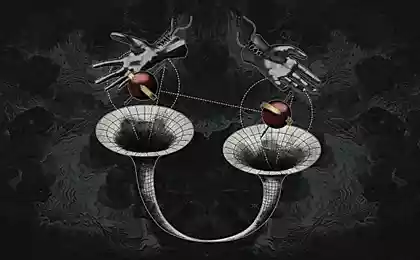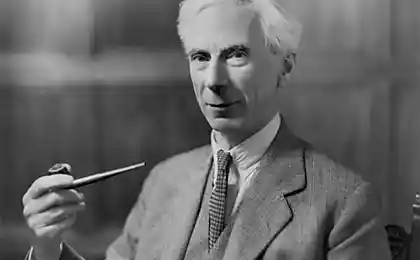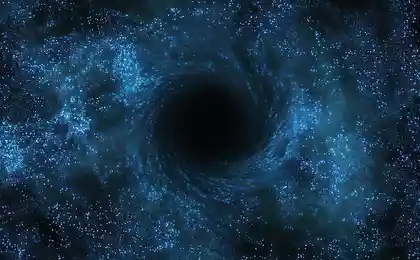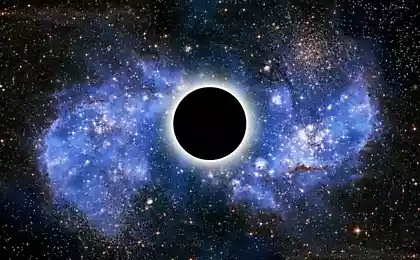644
Why physicists can't stand the information paradox of black holes?
You've probably heard that black holes destroy information that gets them. Why is this such a huge problem for physics that scientists are struggling to get rid of this ridiculous and illogical language? Well, the world has become quite complex. In my childhood, everything was simpler. The grass was greener, soda tastes better then the black holes were black. That is, black holes and squeezing the matter and energy in an infinitely dense singularity, without creating insurmountable paradoxes. It was a good day.
But they came to an end. Today black holes accommodate all fifty shades of grey, bending the laws of physics one after the other. What is the information paradox of black holes?
First, let's talk about information. When physicists say "information", they mean a particular state of every particle in the Universe: mass, position, spin, temperature, etc. a Fingerprint that uniquely identificeret each, and the probability that these particles are going to do in the Universe. You can take the atoms and crush them up or squeeze together, but quantum wave function that describes them, will always remain.
Quantum physics allows you to run the entire Universe back and forth as long as you pay all of your mathematics: charge, parity and time. This is important. Bright minds tell us that information needs to live, no matter what. Imagine it in the form of energy. You can't destroy energy-only convert.
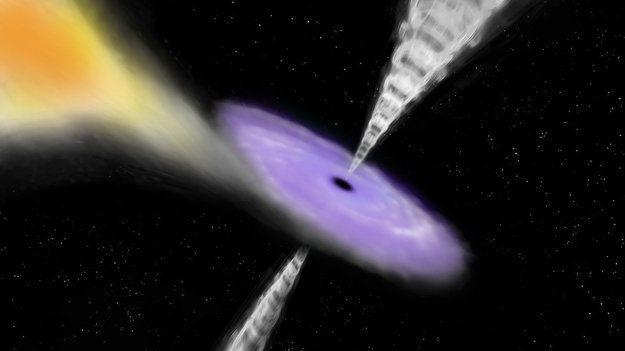
What is a black hole? It is formed when the biggest star with a mass 20 times the sun collapses and explodes violently. Its density of matter is extremely high, the escape velocity exceeds the speed of light. Especially cool are the superheated accretion disk of matter that swirls around the event horizon of a black hole, beyond which light can not escape in any way.
And here we have one of the strangest side-effects of relativity: time dilation. Imagine a clock falling toward the black hole, which sucks in the gravity well. Time will go slower as you get closer to the black hole, until it finally will not freeze at the edge of the event horizon. The photons from the clock stretches, and the color of the clock will pass through the red shift. In the end, it will disappear, because the photons will be stretched beyond what can detect our eyes.
If you looked at a black hole billions of years, you would see all that she has collected that are stuck inside like Velcro. You'd watch, and "Titanic", and theoretically would be able to determine the quantum state of each particle and the photon, which fell into a black hole. Because it will require almost an infinite amount of time to evaporate completely, all right.
Information is stored permanently on the surface of a black hole. All that got there, definitely died, but their information, their precious quantum information, in order.
Would you be able to unravel the black hole, you would have received the quantum information that describes all that he used black hole. Anyway, that was in the good old days.
In 1975, Stephen Hawking dumped on the black hole bomb. He realized that black holes have a temperature and over a huge period of time they will completely evaporate, releasing mass and energy back into the Universe. This process was identified as Hawking radiation.
But the same idea gave rise to the paradox. Information about what fell into a black hole remains a slowing of time, but the mass of the black hole evaporates. In the end she will completely disappear, and then where you will get the information? The information cannot be destroyed?
Astronomers in shock. For decades they work on trying to resolve this issue. There is a small set of options:
Thus, the information about everything that falls, is preserved the outgoing radiation is returned into the Universe and resolves the paradox. But this is a guess, since the radiation Hawking found no one. We may after many decades to learn not only in the right direction we are moving or not, and in fact the solution of the paradox.
In situations like this we remember how little we know about the Universe really is. published
P. S. And remember, only by changing their consumption — together we change the world! © Join us at Facebook , Vkontakte, Odnoklassniki
Source: hi-news.ru
But they came to an end. Today black holes accommodate all fifty shades of grey, bending the laws of physics one after the other. What is the information paradox of black holes?
First, let's talk about information. When physicists say "information", they mean a particular state of every particle in the Universe: mass, position, spin, temperature, etc. a Fingerprint that uniquely identificeret each, and the probability that these particles are going to do in the Universe. You can take the atoms and crush them up or squeeze together, but quantum wave function that describes them, will always remain.
Quantum physics allows you to run the entire Universe back and forth as long as you pay all of your mathematics: charge, parity and time. This is important. Bright minds tell us that information needs to live, no matter what. Imagine it in the form of energy. You can't destroy energy-only convert.

What is a black hole? It is formed when the biggest star with a mass 20 times the sun collapses and explodes violently. Its density of matter is extremely high, the escape velocity exceeds the speed of light. Especially cool are the superheated accretion disk of matter that swirls around the event horizon of a black hole, beyond which light can not escape in any way.
And here we have one of the strangest side-effects of relativity: time dilation. Imagine a clock falling toward the black hole, which sucks in the gravity well. Time will go slower as you get closer to the black hole, until it finally will not freeze at the edge of the event horizon. The photons from the clock stretches, and the color of the clock will pass through the red shift. In the end, it will disappear, because the photons will be stretched beyond what can detect our eyes.
If you looked at a black hole billions of years, you would see all that she has collected that are stuck inside like Velcro. You'd watch, and "Titanic", and theoretically would be able to determine the quantum state of each particle and the photon, which fell into a black hole. Because it will require almost an infinite amount of time to evaporate completely, all right.
Information is stored permanently on the surface of a black hole. All that got there, definitely died, but their information, their precious quantum information, in order.
Would you be able to unravel the black hole, you would have received the quantum information that describes all that he used black hole. Anyway, that was in the good old days.
In 1975, Stephen Hawking dumped on the black hole bomb. He realized that black holes have a temperature and over a huge period of time they will completely evaporate, releasing mass and energy back into the Universe. This process was identified as Hawking radiation.
But the same idea gave rise to the paradox. Information about what fell into a black hole remains a slowing of time, but the mass of the black hole evaporates. In the end she will completely disappear, and then where you will get the information? The information cannot be destroyed?
Astronomers in shock. For decades they work on trying to resolve this issue. There is a small set of options:
- Black holes don't evaporate at all, Hawking was wrong.
- Information in a black hole somehow leaked along with Hawking radiation.
- The black hole holds it until the very end, and evaporate when the last two particles, all the information suddenly is released to the Universe.
- The information is compressed into a microscopic space, which remains after evaporation of a black hole.
Thus, the information about everything that falls, is preserved the outgoing radiation is returned into the Universe and resolves the paradox. But this is a guess, since the radiation Hawking found no one. We may after many decades to learn not only in the right direction we are moving or not, and in fact the solution of the paradox.
In situations like this we remember how little we know about the Universe really is. published
P. S. And remember, only by changing their consumption — together we change the world! © Join us at Facebook , Vkontakte, Odnoklassniki
Source: hi-news.ru
The modern economy as dystopia: why technology makes people poor
Your cat wants to kill You: debunking a popular myth

